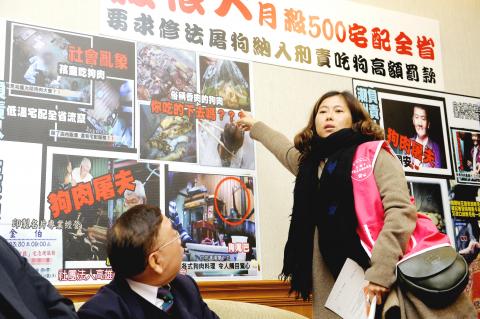Animal protection activists yesterday accused government agencies of not being active enough in prosecuting dog slaughterhouses and dog meat restaurants.
Watching a video clip shot with a hidden camera in a dog slaughterhouse that has a restaurant attached to it selling dog meat dishes, Kaohsiung Concern for Stray Animal Association (KCSAA) chairwoman Wang Hsiao-hua (王小華) burst into tears during a press conference hosted by Democratic Progressive Party Legislator Tien Chiu-chin (田秋堇).
The video showed equipment used for slaughtering dogs and processing dog meat, as well as customers enjoying various dog meat dishes in the restaurant.

Photo: George Tsorng, Taipei Times
“You can always trust the food in this restaurant, it’s been around for more than 50 years,” an elderly customer having a dog meat meal with his two grandchildren was filmed as saying.
The dog slaughterhouse, run by Wang Tien-chih (王天枝), not only serves dog meat in the restaurant, but according to his business card, Wang also provides a home delivery service for frozen dog meat.
“This is a well-known dog slaughterhouse and a large dog meat supplier in Chaojhou Township [潮州], Pingtung County. If you ask anyone in Chaojhou who slaughters dogs, they would tell you it’s Wang Tien-chih,” Wang Hsiao-hua said. “How come government agencies are so reluctant to prosecute?”
According to the Animal Protection Act (動物保護法), the slaughter of pet animals — mainly dogs and cats — and the sale of the meat is prohibited.
Slaughter of dogs and cats can be punished by a fine of between NT$200,000 and NT$1 million, while those selling dog or cat meat are subject to a fine of between NT$50,000 and NT$250,000, the law stipulates.
Repeat offenders can be jailed for up to a year, according to the law.
Wang Hsiao-hua said her organization had reported the case to the Pingtung County Department of Agriculture, which is in charge of animal protection, three years ago.
“However, when agents from the department went to Wang Tien-chih’s shop, he insisted that he sold only goat meat and he refused to allow agents into his slaughterhouse or to take samples of the meat,” Wang Hsiao-hua said. “The agents could do nothing about it because they did not have a search warrant.”
KCSAA workers then pretended to be customers, shot video clips with hidden cameras, bought dog meat and turned the evidence over to the county’s Department of Agriculture.
“Officials then told us that it would be difficult to use what we had as evidence in the court, since the samples were not collected legally,” Wang Hsiao-hua said. “The government is so reluctant to act, yet when we acted, they say our evidence may be problematic. What should we do?”
Responding to the KCASS, the Council of Agriculture’s animal protection officer, Lin Tsung-yi (林宗毅), said he would check to see if the county’s Department of Agriculture was having any difficulty with the case and provide it with any assistance it needed.
In addition, a representative from Taiwan Sugar Co’s assets management office, Huang Chin-tsung (黃錦宗), said that the company would immediately terminate its rental contract with Wang Tien-chih. The slaughterhouse and restaurant are on a piece of property rented from the company.

Chinese Nationalist Party (KMT) Chairman Eric Chu (朱立倫), spokeswoman Yang Chih-yu (楊智伃) and Legislator Hsieh Lung-chieh (謝龍介) would be summoned by police for questioning for leading an illegal assembly on Thursday evening last week, Minister of the Interior Liu Shyh-fang (劉世芳) said today. The three KMT officials led an assembly outside the Taipei City Prosecutors’ Office, a restricted area where public assembly is not allowed, protesting the questioning of several KMT staff and searches of KMT headquarters and offices in a recall petition forgery case. Chu, Yang and Hsieh are all suspected of contravening the Assembly and Parade Act (集會遊行法) by holding

PRAISE: Japanese visitor Takashi Kubota said the Taiwanese temple architecture images showcased in the AI Art Gallery were the most impressive displays he saw Taiwan does not have an official pavilion at the World Expo in Osaka, Japan, because of its diplomatic predicament, but the government-backed Tech World pavilion is drawing interest with its unique recreations of works by Taiwanese artists. The pavilion features an artificial intelligence (AI)-based art gallery showcasing works of famous Taiwanese artists from the Japanese colonial period using innovative technologies. Among its main simulated displays are Eastern gouache paintings by Chen Chin (陳進), Lin Yu-shan (林玉山) and Kuo Hsueh-hu (郭雪湖), who were the three young Taiwanese painters selected for the East Asian Painting exhibition in 1927. Gouache is a water-based

Taiwan would welcome the return of Honduras as a diplomatic ally if its next president decides to make such a move, Minister of Foreign Affairs Lin Chia-lung (林佳龍) said yesterday. “Of course, we would welcome Honduras if they want to restore diplomatic ties with Taiwan after their elections,” Lin said at a meeting of the legislature’s Foreign Affairs and National Defense Committee, when asked to comment on statements made by two of the three Honduran presidential candidates during the presidential campaign in the Central American country. Taiwan is paying close attention to the region as a whole in the wake of a

OFF-TARGET: More than 30,000 participants were expected to take part in the Games next month, but only 6,550 foreign and 19,400 Taiwanese athletes have registered Taipei city councilors yesterday blasted the organizers of next month’s World Masters Games over sudden timetable and venue changes, which they said have caused thousands of participants to back out of the international sporting event, among other organizational issues. They also cited visa delays and political interference by China as reasons many foreign athletes are requesting refunds for the event, to be held from May 17 to 30. Jointly organized by the Taipei and New Taipei City governments, the games have been rocked by numerous controversies since preparations began in 2020. Taipei City Councilor Lin Yen-feng (林延鳳) said yesterday that new measures by